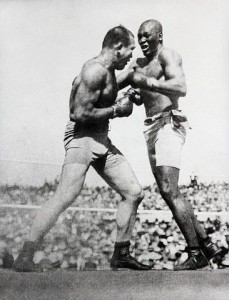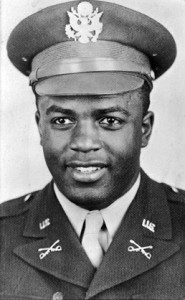How the GI Bill’s Promise Was Denied to a Million Black WWII Veterans
The sweeping bill promised prosperity to veterans. So why didn’t black Americans benefit?
Photo credit: Universal History Archive/Universal Images Group/Getty Images
(History) When Eugene Burnett saw the neat tract houses of Levittown, New York, he knew he wanted to buy one. It was 1949, and he was ready to settle down in a larger home with his family. The newly established Long Island suburb seemed like the perfect place to begin their postwar life—one that, he hoped, would be improved with the help of the GI Bill, a piece of sweeping legislation aimed at helping World War II veterans like Burnett prosper after the war.
But when he spoke with a salesman about buying the house using a GI Bill-guaranteed mortgage, the door to suburban life in Levittown slammed firmly in his face. The suburb wasn’t open to black residents.
“It was as though it wasn’t real,” Burnett’s wife, Bernice, recalled. “Look at this house! Can you imagine having this? And then for them to tell me because of the color of my skin that I can’t be part of it?”
The Burnetts weren’t the only black Americans for whom the promise of the GI Bill turned out to be an illusion. Though the bill helped white Americans prosper and accumulate wealth in the postwar years, it didn’t deliver on that promise for veterans of color. In fact, the wide disparity in the bill’s implementation ended up helping drive growing gaps in wealth, education and civil rights between white and black Americans. (more)
Rice’s reckoning: University to launch task force to address its segregationist history
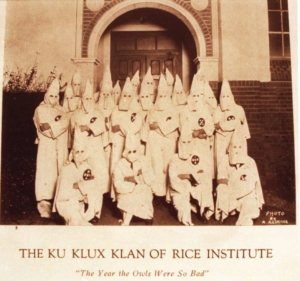 (Houston Chronicle) It’s no secret that Rice University has a complicated history.
(Houston Chronicle) It’s no secret that Rice University has a complicated history.
The founder, William Marsh Rice, a Massachusetts businessman and a slave owner who spent time in Texas, chartered the university, formerly known as the Rice Institute, with a hefty endowment in 1891 strictly for “the white inhabitants of the City of Houston, and State of Texas.” The school, intended to be tuition-free, didn’t admit black undergraduates until 1965, and a recent dive into university yearbooks showed that the university had, albeit briefly, a student chapter of the Ku Klux Klan and had social gatherings with blackface at least until the 1980s.
The university has since evolved, but that doesn’t excuse its history, and Rice isn’t shying away from it. This fall, the university will look to address its controversial history head-on with the community’s help.
A “Task Force on Slavery, Segregation and Racial Injustice” will launch in the fall and explore the private university’s controversial history in relation to slavery and racial injustice with the hope of sparking dialogue on campus and offering a better understanding of its past. (more)
This Long-Ignored Document, Written by George Washington, Lays Bare the Legal Power of Genealogy
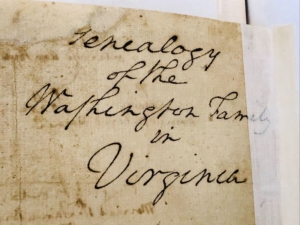
In the corner of one side of the document, Washington wrote “Genealogy of the Washington Family in Virginia” (Courtesy Karin Wulf. Document at the Library of Congress, George Washington Papers, Series 4, General Correspondence: George Washington, Genealogy Chart, 1753.)
(Smithsonian) The scads of advertisements from Ancestry.com or PBS’ “Finding Your Roots” make it easy to imagine genealogy as the arena of the hobbyist or amateur historian. Sites and shows like those and others suggest that, in our highly individualistic world, ancestry is just a pastime. But in fact ancestry still has (literally) grave consequences. Matters of inheritance and heritage are at the core of many functions of the state, from birthright citizenship to Native American ancestry to matters of probate. Such is the reality now, and so it was in the founding years of the United States.
For a man of his times like George Washington, but also for men and women without his wealth or prominence, lineage was foundational. By the time he was 18, George Washington was a competent genealogist — and he had to be. In Washington’s Virginia, family was a crucial determinant of social and economic status, and freedom.
How did Washington understand his family, and what can that tell us about the world in which he lived and played such a significant role? Thanks to a document long ignored by biographers and historians alike, we now know how fully he grasped the basic truth that genealogy is power. (more)
Montgomery to honor black soldier wounded first in fight for Texas with monument
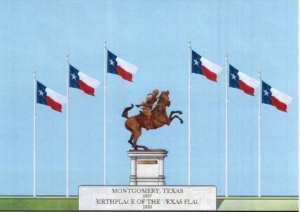
The design for a new welcome monument in Montgomery will pay tribute to the first Texan Soldier wounded in the Texas Revolution, Samuel McCullough, Jr., as well as the Texas Flag.
(The Courier) Montgomery’s new welcome monument to the “Birthplace of the Texas flag” will pay tribute to the first casualty of the Texas Revolution — a free black soldier.
Highlighting Samuel McCulloch, Jr. as the centerpiece, the monument will be located in front of the new Spirit of Texas Bank. A large Texas flag waving from a 130-foot pole will stand behind the bank that will open in the near future at the corner of Texas 105 and Lone Star Parkway.
“We are honored to be a part of this city led by an outstanding Mayor and a strong City Council,” Spirit of Texas Bank Chairman and CEO Dean O. Bass said in a statement. “Montgomery, Texas area is a great community. It is a rapidly growing community and the birthplace of the Texas flag. Sam McCulloch, Jr. made the first sacrifice for Texas’ freedom and independence. When he was wounded during the Revolution, he helped make possible the Texas that we know and love today. He is one of the unsung heroes of Texas and we want to help tell his story.” (more)
TIPHC Bookshelf
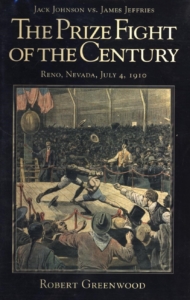 Published scholarship on black history in Texas is growing and we’d like to share with you some suggested readings, both current and past, from some of the preeminent history scholars in Texas and beyond. We invite you to take a look at our bookshelf page – including a featured selection – and check back as the list grows. A different selection will be featured each week. We welcome suggestions and reviews. This week, we offer, “Jack Johnson vs. James Jeffries, The Prize Fight of the Century,” by Robert Greenwood.
Published scholarship on black history in Texas is growing and we’d like to share with you some suggested readings, both current and past, from some of the preeminent history scholars in Texas and beyond. We invite you to take a look at our bookshelf page – including a featured selection – and check back as the list grows. A different selection will be featured each week. We welcome suggestions and reviews. This week, we offer, “Jack Johnson vs. James Jeffries, The Prize Fight of the Century,” by Robert Greenwood.
Greenwood makes a case that the 1910 interracial bout remains the “Fight of the Century.” The gate was the largest recorded up to that time — 18,000 fans showed up, more than could be seated. The $100,000 purse was a prize fight record — with another $100,000 offered for the motion picture rights. It renewed interest in boxing when the sport had been banned in every state but Nevada. The correspondents sent to cover the contest included Jack London, John L. Sullivan, Bat Masterson, Rube Goldberg and Rex Beach. Coming out of a six-year retirement, former champion Jeffries was, of course, the “Great White Hope.” After Johnson became champion, of course, the federal government went to work to bring down this “uppity negro,” framing him on charges of “transporting a (white) woman across state lines for immoral purposes” — even though he had never met the 18-year-old Lucille Cameron until after she came to Chicago. Johnson stayed in shape, fighting several exhibition bouts while in prison, and upon his release at age 42 challenged Jack Dempsey for the championship. But the racist Dempsey refused to fight a black man. Arthur Ashe later called Johnson “the most significant black athlete in history.”
This Week in Texas Black History
Jul 1
 University of Houston and Olympic sprint and long jump star Carl Lewis was born on this date in 1961 in Birmingham, Alabama. Lewis graduated from Willingboro (N.J.) High School in 1979 and entered UH as the top-ranked high school track athlete in the country. He kept his top national ranking in the long jump and the 100-meter dash at the 1981 National Collegiate Athletic Association (NCAA) indoor championships and was the first athlete to win two events at an NCAA championship. As an Olympian, Lewis became the first African-American athlete since Jesse Owens in 1936 to win four gold medals in Olympic competition. Lewis won nine gold medals combined in the 100 and 200 meter sprints, the 4×100 meter relay, and the long jump, in four consecutive Olympics – 1984 Los Angeles, 1988 Seoul, 1992 Barcelona, and 1996 Atlanta. He won gold eight times in World Championships competitions. In December 2001, Lewis was elected to the National Track and Field Hall of Fame, was voted “Sportsman of the Century” by the International Olympic Committee, and “Olympian of the Century” by Sports Illustrated magazine.
University of Houston and Olympic sprint and long jump star Carl Lewis was born on this date in 1961 in Birmingham, Alabama. Lewis graduated from Willingboro (N.J.) High School in 1979 and entered UH as the top-ranked high school track athlete in the country. He kept his top national ranking in the long jump and the 100-meter dash at the 1981 National Collegiate Athletic Association (NCAA) indoor championships and was the first athlete to win two events at an NCAA championship. As an Olympian, Lewis became the first African-American athlete since Jesse Owens in 1936 to win four gold medals in Olympic competition. Lewis won nine gold medals combined in the 100 and 200 meter sprints, the 4×100 meter relay, and the long jump, in four consecutive Olympics – 1984 Los Angeles, 1988 Seoul, 1992 Barcelona, and 1996 Atlanta. He won gold eight times in World Championships competitions. In December 2001, Lewis was elected to the National Track and Field Hall of Fame, was voted “Sportsman of the Century” by the International Olympic Committee, and “Olympian of the Century” by Sports Illustrated magazine.
Jul 1
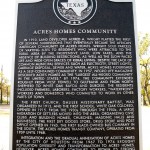 The Acres Homes Transit Company became the first African-American-owned bus franchise in the South on this day in 1959 when it received state certification. The predominantly black Acres Homes residents lived outside Houston’s city limits and nine miles northwest of downtown and had petitioned city hall for a permit to operate the franchise. The Yale Street Bus Line had ceased commuter service to the area the previous year. Four AHTC buses made 43 round trips a day between downtown Houston and Acres Homes, which was annexed to Houston in 1967.
The Acres Homes Transit Company became the first African-American-owned bus franchise in the South on this day in 1959 when it received state certification. The predominantly black Acres Homes residents lived outside Houston’s city limits and nine miles northwest of downtown and had petitioned city hall for a permit to operate the franchise. The Yale Street Bus Line had ceased commuter service to the area the previous year. Four AHTC buses made 43 round trips a day between downtown Houston and Acres Homes, which was annexed to Houston in 1967.
Jul 3
 Ruth J. Simmons was born on this day in 1945 in Grapeland and 56 years to the day was sworn in as the 18th president of Brown University in 2001, becoming the first black president of an Ivy League school and the first female president at Brown (founded in 1764). Simmons was the youngest of 12 children born to a sharecropper father and a mother who worked as a maid. In 1995, Simmons became the first African-American woman to head a major college or university when she was selected as president of Smith College, which she led until 2001. She also served as Vice Provost at Princeton University, and a Provost at Spelman College. Simmons graduated from Phillis Wheatley High School in Houston and Dillard University, a historically black college in New Orleans. She earned her Ph.D. in Romance Languages and Literatures from Harvard. In June 2017, she was named interim president of Prairie View A&M University, and on Dec. 4, 2017 was officially named the school’s eighth president.
Ruth J. Simmons was born on this day in 1945 in Grapeland and 56 years to the day was sworn in as the 18th president of Brown University in 2001, becoming the first black president of an Ivy League school and the first female president at Brown (founded in 1764). Simmons was the youngest of 12 children born to a sharecropper father and a mother who worked as a maid. In 1995, Simmons became the first African-American woman to head a major college or university when she was selected as president of Smith College, which she led until 2001. She also served as Vice Provost at Princeton University, and a Provost at Spelman College. Simmons graduated from Phillis Wheatley High School in Houston and Dillard University, a historically black college in New Orleans. She earned her Ph.D. in Romance Languages and Literatures from Harvard. In June 2017, she was named interim president of Prairie View A&M University, and on Dec. 4, 2017 was officially named the school’s eighth president.
Jul 4
 On this date in 1867, the Texas Republican Party was formed at a convention in Houston with African-American delegates outnumbering whites by a total of about 150 to 20. Blacks, comprising about 90 percent of the party throughout Reconstruction, would set the foundation for the party. Forty-four black Republicans would serve in the state legislature. The second State GOP Chairman, Norris Wright Cuney, an African-American from Galveston led the Party from 1883 to 1897 and is said by historians to have held “the most important political position given to a black man of the South in the nineteenth century.”
On this date in 1867, the Texas Republican Party was formed at a convention in Houston with African-American delegates outnumbering whites by a total of about 150 to 20. Blacks, comprising about 90 percent of the party throughout Reconstruction, would set the foundation for the party. Forty-four black Republicans would serve in the state legislature. The second State GOP Chairman, Norris Wright Cuney, an African-American from Galveston led the Party from 1883 to 1897 and is said by historians to have held “the most important political position given to a black man of the South in the nineteenth century.”
Jul 4
On this date in 2003, R&B singer and composer Barry White, a Galveston native, died at age 58 of renal failure in Los Angeles. A five-time Grammy Award winner, White’s gravelly, seductive, bass voice earned him 106 gold and 41 platinum albums, 20 gold and 10 platinum singles, with worldwide sales in excess of $100 million. White had suffered with high blood pressure for many years and then diabetes.
Jul 4
In what was billed as “The Fight of the Century,” Galveston’s Jack Johnson soundly defeated Jim Jeffries, “The Great White Hope,” on this day in 1910 before a mostly white crowd of 22,000 fans in Reno, Nevada to remain as world heavyweight champion. Jeffries came out of a five-year retirement from his undefeated career to fight the racially reviled Johnson. Jeffries said, “I am going into this fight for the sole purpose of proving that a white man is better than a Negro.” Promoters incited the crowd to chant “kill the nigger.” However, the bout was scheduled for 45 rounds, but was stopped in the 15th after Johnson twice knocked Jeffries down. The outcome produced race riots in dozens of cities with some of the incidents the result of whites interrupting celebrations of jubilant blacks. Police also interrupted several attempted lynchings.
Jul 6
In 1944, at Fort Hood Army Post in Killeen, Lt. Jackie Robinson refused to move to the back of a post bus and was taken into custody by military police, an incident that would lead to his court-martial. Three years before he would break the color line in Major League Baseball, Robinson was charged with insubordination, disturbing the peace, drunkenness (he did not drink), conduct unbecoming an officer, and refusing to obey the lawful orders of a superior officer. Robinson, serving in a support role for the all-black 761st Tank Battalion (the Army’s first such unit), would be acquitted a month later by an all-white panel of nine officers. (See, National Archives: “Jim Crow, Meet Lieutenant Robinson, A 1944 Court-Martial“, and The History Reader, “The Court Martial of Jackie Robinson.”)
Blog: Ron Goodwin, Ph.D., author, PVAMU history professor
Ron Goodwin is an assistant professor of history at Prairie View A&M University. Even though he was a military “brat,” he still considers San Antonio home. Like his father and brother, Ron joined the U.S. Air Force and while enlisted received his undergraduate degree from Texas Lutheran University in Seguin, Texas. After his honorable discharge, he completed graduate degrees from Texas Southern University. Goodwin’s book, Blacks in Houston, is a pictorial history of Houston’s black community. His most recent book, Remembering the Days of Sorrow, examines the institution of slavery in Texas from the perspective of the New Deal’s Slave Narratives.
Recent Posts
Death is nothing at all
“Therefore we are always confident, knowing that, whilst we are at home in the body, we are absent from the Lord: (For we walk by faith, not by sight:). We are confident, I say, and willing rather to be absent from the body, and to be present with the Lord.” 2 Cor 5: 6-8 As a child my father and I would watch “Hogan’s Heroes.” It’s a silly sitcom, but I remember how I enjoyed…(more)
The Everlasting Light
Ye are the light of the world. A city that is set on an hill cannot be hid. Neither do men light a candle, and put it under a bushel, but on a candlestick; and it giveth light unto all that are in the house. Let your light so shine before men, that they may see your good works, and glorify your Father which is in heaven. — Matthew 5: 14-16 This is the month set…(more)
Submissions wanted
Historians, scholars, students, lend us your…writings. Help us produce the most comprehensive documentation ever undertaken for the African American experience in Texas. We encourage you to contribute items about people, places, events, issues, politics/legislation, sports, entertainment, religion, etc., as general entries or essays. Our documentation is wide-ranging and diverse, and you may research and write about the subject of your interest or, to start, please consult our list of suggested biographical entries and see submission guidelines. However, all topics must be approved by TIPHC editors before beginning your research/writing.
We welcome your questions or comments. Please contact Michael Hurd, Director of TIPHC, at mdhurd@pvamu.edu.


